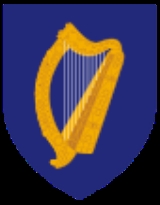
Irish heraldry
Encyclopedia
Irish heraldry are the forms of heraldry
, such as coats of arms, in Ireland
. It is regulated in Ireland
by the Office of the Chief Herald of Ireland
and in Northern Ireland
by Norroy and Ulster King of Arms
.
ed) in a specialized jargon that uses derivatives of French
terms. In Irish, however, achievements of arms are described in language which, while formal and different from plain language, is not quite so opaque as Anglo-Norman terminology is in English. Nevertheless Irish heraldic terminology is a kind of specialized jargon. Examples include the use of Irish gorm and uaine for blue and green, as compared to the French-derived azure and vert used in English blazon.
and is located at the National Library of Ireland
. The office was constituted on 1 April 1943, taking over the records of the Ulster King of Arms, a crown
office dating from 1552.
It has jurisdiction over:
ed as Azure a harp Or, stringed argent - a gold harp
with silver strings on a St. Patrick's Blue
background. The harp, and specifically the Clársach
(or Gaelic harp), has long been Ireland
's heraldic emblem. It appears on the coat of arms
which were officially registered as the arms of the state of Ireland
on 9 November 1945. The harp has been recognised as a symbol
of Ireland
since the 13th century
Heraldry
Heraldry is the profession, study, or art of creating, granting, and blazoning arms and ruling on questions of rank or protocol, as exercised by an officer of arms. Heraldry comes from Anglo-Norman herald, from the Germanic compound harja-waldaz, "army commander"...
, such as coats of arms, in Ireland
Ireland
Ireland is an island to the northwest of continental Europe. It is the third-largest island in Europe and the twentieth-largest island on Earth...
. It is regulated in Ireland
Ireland
Ireland is an island to the northwest of continental Europe. It is the third-largest island in Europe and the twentieth-largest island on Earth...
by the Office of the Chief Herald of Ireland
Office of the Chief Herald of Ireland
The Genealogical Office is an office of the Government of Ireland containing genealogical records. It includes the Office of the Chief Herald of Ireland , the authority in the Republic of Ireland for heraldry. The Chief Herald authorises the granting of arms to Irish bodies and Irish people,...
and in Northern Ireland
Northern Ireland
Northern Ireland is one of the four countries of the United Kingdom. Situated in the north-east of the island of Ireland, it shares a border with the Republic of Ireland to the south and west...
by Norroy and Ulster King of Arms
Norroy and Ulster King of Arms
Norroy and Ulster King of Arms is one of the senior Officers of Arms of the College of Arms, and the junior of the two provincial Kings of Arms. The current office is the combination of two former appointments...
.
Terminology
In English, achievements of arms are usually described (blazonBlazon
In heraldry and heraldic vexillology, a blazon is a formal description of a coat of arms, flag or similar emblem, from which the reader can reconstruct the appropriate image...
ed) in a specialized jargon that uses derivatives of French
French language
French is a Romance language spoken as a first language in France, the Romandy region in Switzerland, Wallonia and Brussels in Belgium, Monaco, the regions of Quebec and Acadia in Canada, and by various communities elsewhere. Second-language speakers of French are distributed throughout many parts...
terms. In Irish, however, achievements of arms are described in language which, while formal and different from plain language, is not quite so opaque as Anglo-Norman terminology is in English. Nevertheless Irish heraldic terminology is a kind of specialized jargon. Examples include the use of Irish gorm and uaine for blue and green, as compared to the French-derived azure and vert used in English blazon.
| Tinctures Tincture (heraldry) In heraldry, tinctures are the colours used to emblazon a coat of arms. These can be divided into several categories including light tinctures called metals, dark tinctures called colours, nonstandard colours called stains, furs, and "proper". A charge tinctured proper is coloured as it would be... |
Metals | Paints or Colours | Furs | ||||||
|---|---|---|---|---|---|---|---|---|---|
| Escutcheons |  |
 |
 |
 |
 |
 |
 |
 |
 |
| English | Or | Argent | Azure | Gules | Vert | Purpure | Sable | Ermine | Vair |
| Irish | Ór (órga) | Airgead (airgidí) | Gorm | Dearg | Uaine | Corcra | Dubh | Eirmín | Véir |
| Ordinaries Ordinary (heraldry) In heraldry, an ordinary is a simple geometrical figure, bounded by straight lines and running from side to side or top to bottom of the shield. There are also some geometric charges known as subordinaries, which have been given lesser status by some heraldic writers, though most have been in use... Ríphíosaí |
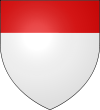 |
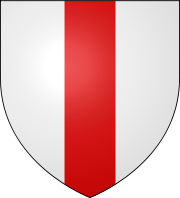 |
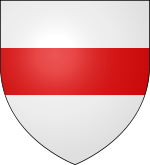 |
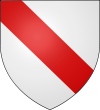 |
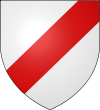 |
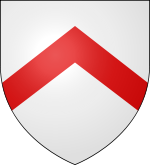 |
|---|---|---|---|---|---|---|
| English | Chief | Pale | Fess | Bend | Bend sinister | Chevron |
| Irish | Barr | Cuaille | Balc | Bandán | Clébhandán | Rachtán |
| Ordinaries Ríphíosaí |
.svg.png) |
.svg.png) |
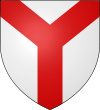 |
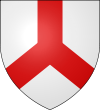 |
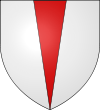 |
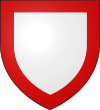 |
| English | Cross | Saltire | Pall | Pall subverted | Pile | Bordure |
| Irish | Cros | Sailtír | Gabhal | Gabhal aisiompaithe | Ding | Imeallbhord |
| Division of the field Division of the field In heraldry, the field of a shield can be divided into more than one area of different tinctures, usually following the lines of one of the ordinaries and carrying its name... |
 |
 |
 |
 |
 |
|---|---|---|---|---|---|
| English | Party per fess | Party per pale | Party per bend sinister | Quarterly | Quarterly charged with an inescutcheon |
| Irish | Gearrtha | Deighilte | Cléroinnte | Ceathair-roinnte | Ceathair-roinnte móide lársciath |
| Lines of division Line (heraldry) The lines of partition used to divide and vary fields and charges in heraldry are by default straight, but may have many different shapes. Care must sometimes be taken to distinguish these types of lines from the extremely unusual and non-traditional use of lines as charges, and to distinguish... |
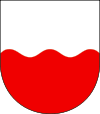 |
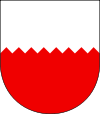 |
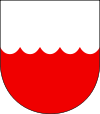 |
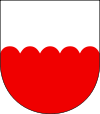 |
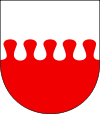 |
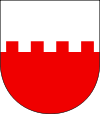 |
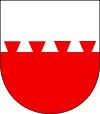 |
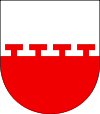 |
|---|---|---|---|---|---|---|---|---|
| English | Wavy | Indented | Engrailed | Invected | Nebuly | Embattled | Dovetailed | Potenty |
| Irish | Camógach | Eangach | Clasach | Dronnógach | Néállach | Táibhleach | Déadach | Cathógach |
Office of the Chief Herald of Ireland
The Office of the Chief Herald of Ireland, sometimes incorrectly called the Office of Arms, is the Republic of Ireland's authority on all heraldic matters relating to IrelandIreland
Ireland is an island to the northwest of continental Europe. It is the third-largest island in Europe and the twentieth-largest island on Earth...
and is located at the National Library of Ireland
National Library of Ireland
The National Library of Ireland is Ireland's national library located in Dublin, in a building designed by Thomas Newenham Deane. The Minister for Arts, Sport & Tourism is the member of the Irish Government responsible for the library....
. The office was constituted on 1 April 1943, taking over the records of the Ulster King of Arms, a crown
Monarchy of the United Kingdom
The monarchy of the United Kingdom is the constitutional monarchy of the United Kingdom and its overseas territories. The present monarch, Queen Elizabeth II, has reigned since 6 February 1952. She and her immediate family undertake various official, ceremonial and representational duties...
office dating from 1552.
It has jurisdiction over:
- All Irish citizens, male or female
- Persons normally resident in Ireland
- Persons living abroad who are of provable Irish descent in either the paternal or maternal line
- Persons with significant links to Ireland
- Corporate bodies within Ireland and corporate bodies with significant links to Ireland but based in countries with no heraldic authority.
Irish Coat of Arms
The Coat of arms of Ireland is blazonBlazon
In heraldry and heraldic vexillology, a blazon is a formal description of a coat of arms, flag or similar emblem, from which the reader can reconstruct the appropriate image...
ed as Azure a harp Or, stringed argent - a gold harp
Harp
The harp is a multi-stringed instrument which has the plane of its strings positioned perpendicularly to the soundboard. Organologically, it is in the general category of chordophones and has its own sub category . All harps have a neck, resonator and strings...
with silver strings on a St. Patrick's Blue
St. Patrick's Blue
St. Patrick's blue is a name applied to several shades of blue considered as symbolic of Ireland. In British usage, it refers to various sky blue shades associated with the Order of St. Patrick. In modern usage in the Republic of Ireland, it may be a darker shade. While green is now the usual...
background. The harp, and specifically the Clársach
Clàrsach
Clàrsach or Cláirseach , is the generic Gaelic word for 'a harp', as derived from Middle Irish...
(or Gaelic harp), has long been Ireland
Ireland
Ireland is an island to the northwest of continental Europe. It is the third-largest island in Europe and the twentieth-largest island on Earth...
's heraldic emblem. It appears on the coat of arms
Coat of arms
A coat of arms is a unique heraldic design on a shield or escutcheon or on a surcoat or tabard used to cover and protect armour and to identify the wearer. Thus the term is often stated as "coat-armour", because it was anciently displayed on the front of a coat of cloth...
which were officially registered as the arms of the state of Ireland
Republic of Ireland
Ireland , described as the Republic of Ireland , is a sovereign state in Europe occupying approximately five-sixths of the island of the same name. Its capital is Dublin. Ireland, which had a population of 4.58 million in 2011, is a constitutional republic governed as a parliamentary democracy,...
on 9 November 1945. The harp has been recognised as a symbol
Symbol
A symbol is something which represents an idea, a physical entity or a process but is distinct from it. The purpose of a symbol is to communicate meaning. For example, a red octagon may be a symbol for "STOP". On a map, a picture of a tent might represent a campsite. Numerals are symbols for...
of Ireland
Ireland
Ireland is an island to the northwest of continental Europe. It is the third-largest island in Europe and the twentieth-largest island on Earth...
since the 13th century

